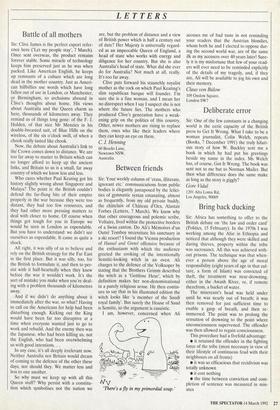LETTERS Battle of all mothers
Sir: Clive James is the perfect export refer- ence here (`Let my people stay', 7 March). Once sent overseas, the product remains forever stable. Some miracle of technology keeps him preserved just as he was when packed. Like American English, he keeps up remnants of a culture which are long dead in the mother country. Just as Ameri- can hillbillies use words which have long fallen out of use in London, or Manchester, or Birmingham, so archaisms abound in Clive's thoughts about home. His views about Australia and the Queen charm us here, thousands of kilometres away. They remind us of things long gone: of the F. J. Holden, of that nice Mr Menzies in his double-breasted suit, of Blue Hills on the wireless, of the six o'clock swill, of when a chook really tasted like chook.
Now, the debate about Australia's link to the Crown comes down to distance. We are too far away to matter to Britain which can no longer afford to keep up the ancient links, and Britain to us is a small, far away country of which we know less and less.
Who cares whether Paul Keating got his history slightly wrong about Singapore and Malaya? The point is: the British couldn't defend the far-flung bits of their empire properly in the war because they were too distant, they had too few resources, and they had other more pressing matters to deal with closer to home. Of course when things got tough for you in Europe we would be seen in London as expendable. But you have to understand: we didn't see ourselves as expendable. It came as quite a shock.
All right, it was silly of us to believe and rely on the British strategy for the Far East in the first place. But it was silly, too, for the British to formulate it, and then to per- sist with it half-heartedly when they knew before the war it wouldn't work. It's the sort of mistake you make when you're deal- ing with a problem thousands of kilometres away.
And if we didn't do anything about it immediately after the war, so what? Having to call on the Americans for help had been disturbing enough. Kicking out the King would have been far too disruptive at a time when everyone wanted just to go to work and rebuild. And the enemy then was the Japanese, who had been killing us, not the English, who had been overwhelming us with good intentions.. .
In any case, it's all deeply irrelevant now. Neither Australia nor Britain would dream of coming to the defence of the other these days, nor should they. We matter less and less to one another.
So why must we keep up with all this Queen stuff? Why persist with a constitu- tion which symbolises not the nation we
are, but the problem of distance and a view of British power which is half a century out of date? Her Majesty is universally regard- ed as an impeccable Queen of England, a head of state who works with energy and diligence for her country. But she is also Australia's head of state. What did she ever do for Australia? Not much at all, really. It's too far away.
Clive puts forward his staunchly royalist mother as the rock on which Paul Keating's slim republican barque will founder. I'm sure she is a fine woman, and I mean her no disrespect when I say I suspect she is not where the future lies. The mothers who produced Clive's generation have a weak- ening grip on the politics of this country. Other, newer mothers are rising to replace them, ones who like their leaders where they can keep an eye on them.
C. J. Henning
60 Brocks Lane, Newtown NSW, Australia.


























































 Previous page
Previous page